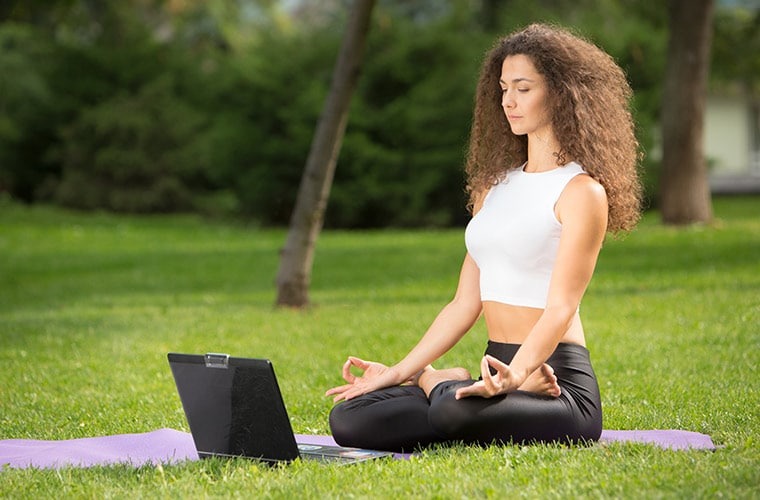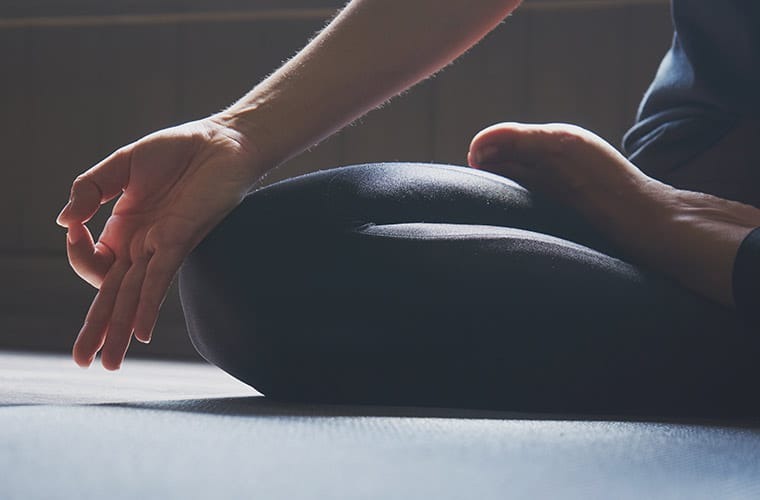
You probably already know that meditation is good for you.
According to research, meditation can make you smarter, happier, and healthier.
And in addition to those feel-good benefits, a recent study shows that meditation can improve anxiety, depression, and even pain.
Athletes are using it to prepare for big games and celebrities are meditating to try to create balance in their hectic schedules.
So why aren’t you doing it?
Let me guess. You don’t have time. You don’t know how. And someone like you could never sit still without your mind racing in a million different directions.
Well, guess what? That’s like not going to yoga class because you’re not flexible enough.
But unlike yoga class, you can start a meditation practice in just 5 minutes a day. There’s even a meditation style that gives you full permission to have a wandering mind.
Mindfulness Meditation
Let’s start by looking at what mindfulness meditation isn’t.
If you’re new to meditation or are only vaguely familiar, you probably imagine Mantra meditation. In this practice, you choose a word or sound (like “Om”) and focus on that one word while you meditate.
Zen meditation is another common practice. With Zen, you don’t focus on anything in particular, other than your breath. When a thought enters your head, you simply dismiss it and return to stillness.
Easier said than done, right?

There’s no need to feel like a failure after you’ve skipped past your third Om and moved on to thinking about your grocery list. But if you’re looking for an alternative meditation practice, consider Mindfulness Meditation.
The focus is still on the breath, but the response to passing thoughts is different. When a thought enters your head, you observe that thought before returning to the breath. Don’t judge the thought or focus too much on moving past it.
Mindfulness fully embraces the wandering mind. It’s completely normal to start your meditation when your mind is racing. After all, you’re likely meditating to unwind from a stressful day or to prepare for a big meeting at work. As you work through the practice, your thoughts will naturally slow.
And as you develop your practice long-term, you’ll find that an added benefit of a practice that allows for a wandering mind is….a mind that wanders less. Over time, you’ll find that being aware of your thoughts, but not judging them, allows you to silence your inner critic and return to a calm state faster.
Starting your Mindfulness Practice
Start by finding a quiet space. Decide how long you want to practice and set a timer. A 5-minute practice is a great way to start.
If it’s comfortable, sit with crossed legs on the floor. Sitting on a yoga block or cushion might make this feel more comfortable. It’s ok to sit on a chair with your feet on the ground if that’s what’s best for your body.
Once you’re comfortable, begin to notice your breathing. Take a few deep breaths and observe the feeling of the breath coming in and going out. Remember, many different thoughts will come and go and that’s normal. Observe the thought and then return your focus to your breath.

Photo Credit: Insight Timer
Use Technology
It should come as no surprise when I tell you, “there’s an app for that!”
There are several meditation apps to choose from that can help you start a meditation practice. I like Insight Timer which has a free and paid version and is available for both iOS and Android devices. Its most basic feature is a simple timer that alerts you to the end of your practice with a soothing chime. There are also several guided meditation practices from well-known meditation teachers. If you’re feeling lost on your own, it can help to follow a guided meditation from time to time.
Developing your Practice
I challenge you to try a 5-minute mindfulness meditation practice within the next 24 hours. Think of it as a permission slip for taking some “you” time.
As you get more comfortable with your practice, you can try longer meditation sessions. Many of the guided routines are 20 minutes if you want to get some experience with a longer practice.
Many of the benefits of mindfulness meditation come from making it a part of your daily routine. Try to meditate every day and see if you experience the stress-reducing, mood boosting benefits.
